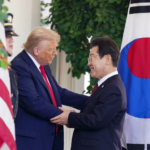Bloomberg: A Wisconsin state judge must face criminal charges of interfering with US immigration authorities after a federal judge rejected her claim of immunity.
The decision on Tuesday means the US Justice Department can move forward with the prosecution of Milwaukee County Judge Hannah Dugan. Her indictment was part of a broader pushback by US officials against so-called sanctuary cities and local authorities perceived as standing in the way of President Donald Trump’s immigration crackdown.
Dugan, who has denied wrongdoing, can appeal the decision by US District Judge Lynn Adelman. The ruling didn’t address the merits of the underlying criminal case. Adelman adopted the recommendation of a US magistrate judge who rebuffed Dugan’s claim of immunity from being prosecuted for actions she took as a judge and proposed the case go forward.
Dugan’s lawyers and a Justice Department spokesperson did not immediately respond to requests for comment.
Dugan was arrested in May and accused of trying to prevent members of a US Immigration and Customs Enforcement task force from arresting a Mexican immigrant, Eduardo Flores-Ruiz, who had appeared in her courtroom.
The two-count indictment alleges Dugan directed federal officials away from Flores-Ruiz’s location inside the Milwaukee courthouse and then allowed him and his lawyer to leave through a nonpublic door.
Adelman rejected Dugan’s arguments for immunity that shields judges from being prosecuted for actions they take related to their official duties. The judge also found that the government plausibly argued that Dugan’s alleged actions fell outside her judicial role, meaning she wouldn’t be covered even if there was some limited judicial immunity. “There is no basis for granting immunity simply because some of the allegations in the indictment describe conduct that could be considered ‘part of a judge’s job,’” Adelman wrote.
Dugan’s lawyers also argued that the indictment violated the Constitution’s division of power between the federal government and states. Her lawyers cited the US Supreme Court’s ruling last year that Trump — and all US presidents — have sweeping immunity from prosecution for official acts.







